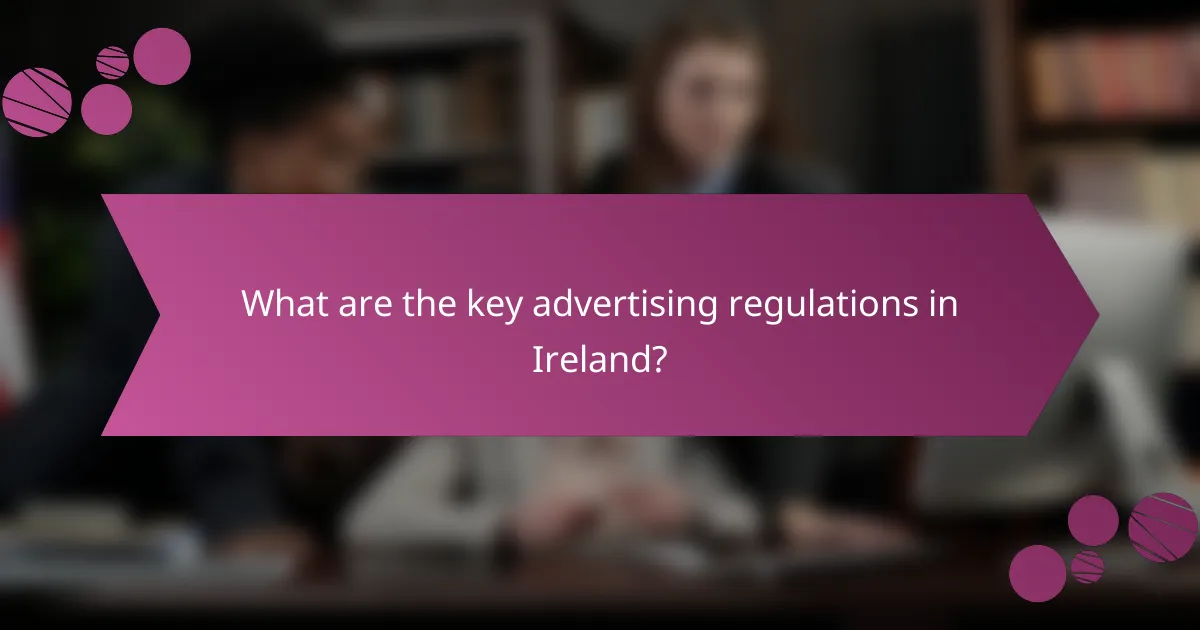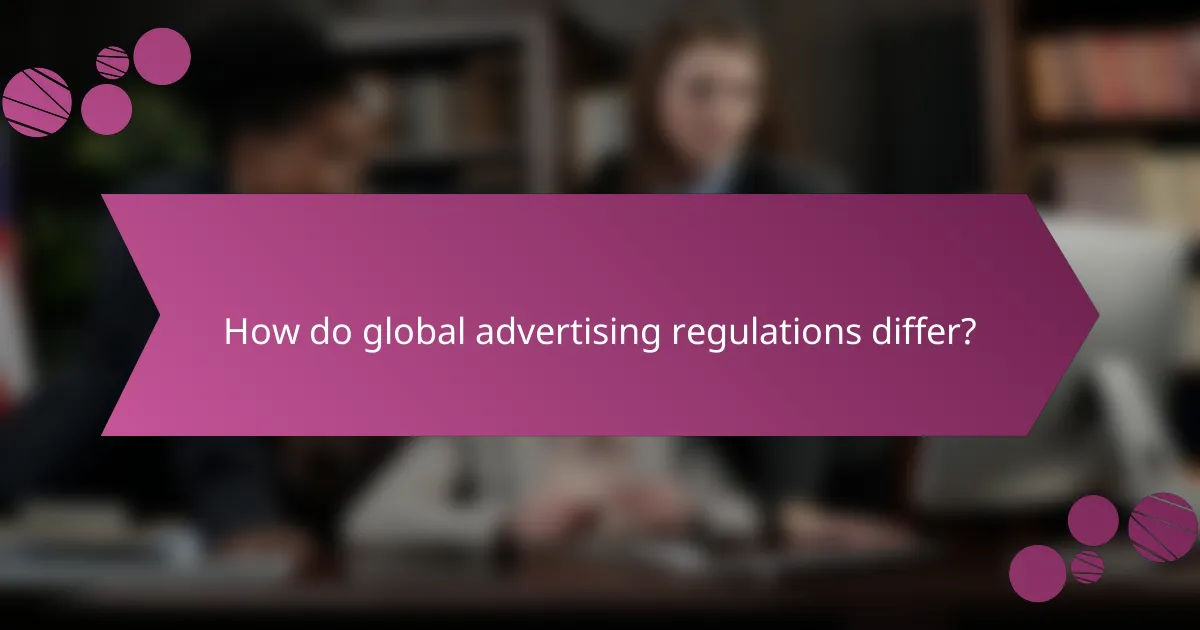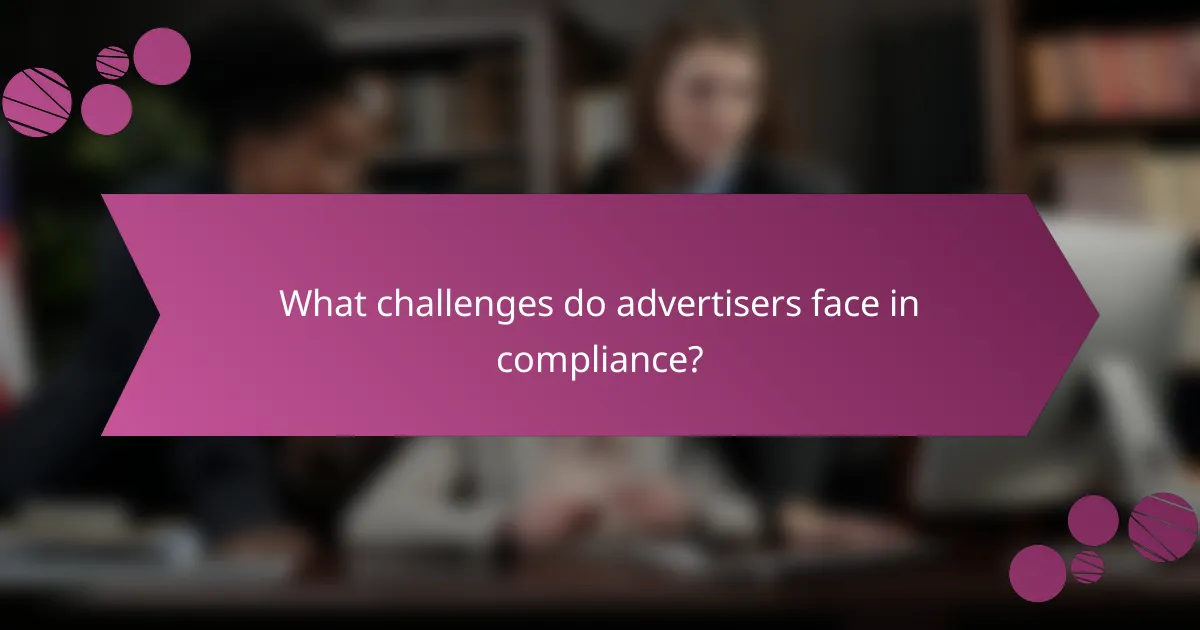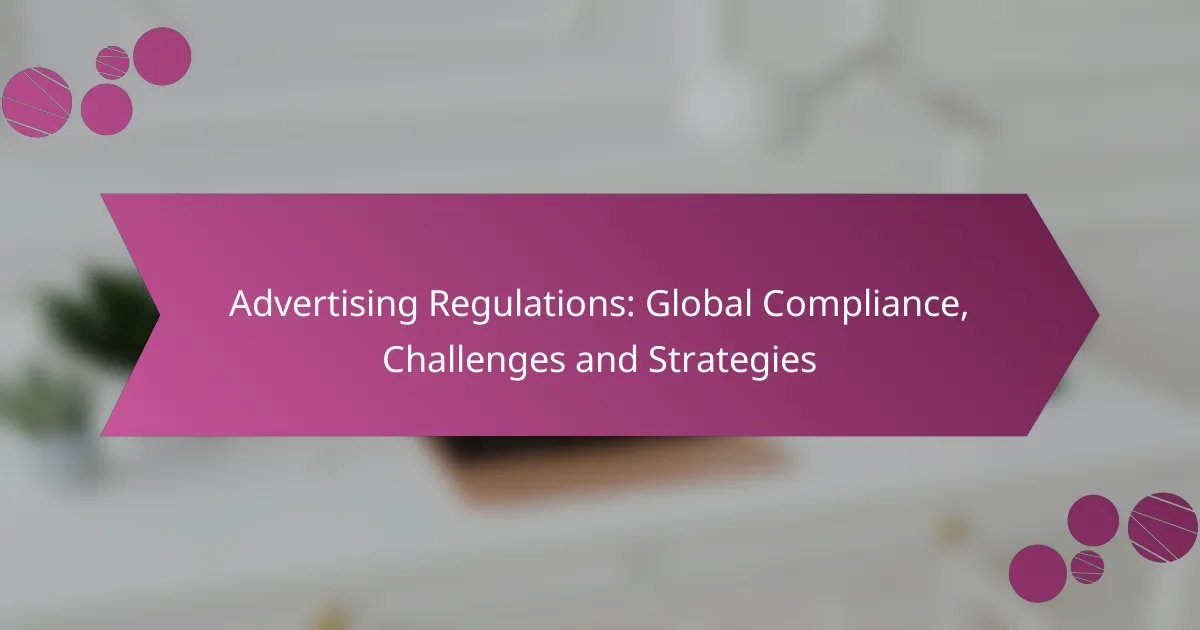Advertising regulations play a crucial role in ensuring fair and transparent marketing practices worldwide, with significant variations across regions due to differing laws and cultural norms. As businesses strive to navigate these complexities, they face challenges related to compliance, rapidly changing legal landscapes, and heightened consumer privacy concerns. Understanding these regulations is essential for developing effective advertising strategies that resonate with diverse audiences while adhering to ethical standards.

What are the key advertising regulations in Ireland?
In Ireland, key advertising regulations focus on ensuring that marketing practices are fair, transparent, and do not mislead consumers. These regulations are enforced by various authorities to protect consumer rights and maintain ethical standards in advertising.
Broadcasting Authority of Ireland regulations
The Broadcasting Authority of Ireland (BAI) oversees advertising content on television and radio. Advertisements must not contain misleading information, promote harmful products, or exploit vulnerable audiences. Specific rules apply to the timing and placement of ads, especially during children’s programming.
Advertisers should be aware of the BAI’s Code of Practice, which outlines acceptable standards for advertising content. Non-compliance can lead to sanctions, including fines or the removal of ads from airwaves.
Data Protection Commission guidelines
The Data Protection Commission (DPC) enforces regulations regarding the collection and use of personal data in advertising. Advertisers must obtain explicit consent from individuals before using their data for targeted marketing. This is particularly relevant in digital advertising, where data tracking is common.
Businesses should implement clear privacy policies and ensure that consumers can easily opt-out of data collection. Failing to comply with DPC guidelines can result in significant penalties, including fines based on a percentage of annual revenue.
Advertising Standards Authority for Ireland codes
The Advertising Standards Authority for Ireland (ASAI) sets codes of practice that govern the content of advertisements across all media. These codes require that ads are legal, decent, honest, and truthful. Claims made in advertisements must be substantiated and not misleading.
Advertisers should regularly review ASAI guidelines to ensure compliance, as the authority investigates complaints and can require the removal of non-compliant ads. Familiarity with these codes is essential for maintaining a reputable brand image and avoiding potential legal issues.

How do global advertising regulations differ?
Global advertising regulations vary significantly based on regional laws, cultural norms, and market practices. These differences can impact how businesses create and disseminate their marketing messages across different countries.
Comparison of EU and US advertising laws
The European Union (EU) has stricter advertising regulations compared to the United States. In the EU, advertising must comply with the General Data Protection Regulation (GDPR), which emphasizes consumer privacy and consent. This means that businesses must be transparent about data usage and obtain explicit consent for targeted advertising.
In contrast, US advertising laws are generally more lenient, focusing on truthfulness and non-deceptiveness under the Federal Trade Commission (FTC) guidelines. While the US does have regulations against misleading advertisements, there is less emphasis on data privacy compared to the EU. Companies operating in both regions must navigate these contrasting legal landscapes to ensure compliance.
Variations in Asia-Pacific advertising standards
The Asia-Pacific region presents a diverse array of advertising standards influenced by local cultures and regulations. For instance, countries like Australia have robust advertising codes that require truthfulness and fairness, similar to the US, but with additional guidelines on social responsibility.
In contrast, markets such as China have unique regulations that can change rapidly, often requiring foreign companies to adapt quickly to new rules. For example, advertising in China must align with government policies and cultural sensitivities, which can include restrictions on certain products and messaging. Businesses should stay informed about local regulations and cultural expectations to effectively navigate this complex landscape.

What challenges do advertisers face in compliance?
Advertisers encounter several challenges in ensuring compliance with regulations across different regions. These challenges stem from the complexity of varying laws, the fast pace of legal changes, and growing consumer privacy concerns.
Complexity of multi-jurisdictional regulations
Advertisers must navigate a patchwork of regulations that differ significantly from one jurisdiction to another. For instance, what is permissible in the United States may not be allowed in the European Union or Asia. This complexity requires a thorough understanding of local laws and the ability to adapt strategies accordingly.
To manage this, businesses should establish a compliance framework that includes regular training for marketing teams and consultations with legal experts familiar with local advertising laws. Utilizing compliance software can also help streamline the process of tracking regulations across multiple regions.
Rapidly changing legal landscapes
The legal environment for advertising is constantly evolving, with new laws and amendments frequently introduced. This dynamic nature can make it difficult for advertisers to stay updated and compliant, leading to potential legal risks. For example, recent changes in data protection laws have significantly impacted how advertisers collect and use consumer data.
To mitigate risks, advertisers should implement a proactive approach by subscribing to legal updates and participating in industry forums. Regularly reviewing and updating compliance policies is essential to adapt to these changes effectively.
Consumer privacy concerns
Growing concerns about consumer privacy are reshaping advertising practices worldwide. Regulations like the General Data Protection Regulation (GDPR) in Europe and the California Consumer Privacy Act (CCPA) in the U.S. impose strict guidelines on how advertisers handle personal data. Non-compliance can result in hefty fines and damage to brand reputation.
Advertisers should prioritize transparency in their data collection practices and ensure that consumers are informed about how their data will be used. Implementing clear consent mechanisms and offering opt-out options can help build trust and ensure compliance with privacy regulations.

What strategies can ensure compliance?
To ensure compliance with advertising regulations, businesses should implement a combination of regular training, compliance management tools, and legal expertise. These strategies help mitigate risks and maintain adherence to diverse global standards.
Regular training for marketing teams
Regular training for marketing teams is essential to keep staff updated on the latest advertising regulations. Training sessions should cover regional laws, ethical advertising practices, and recent changes in compliance requirements.
Consider scheduling quarterly workshops or online courses to reinforce knowledge. Engaging employees through interactive sessions can enhance retention and application of compliance concepts in daily operations.
Utilizing compliance management software
Compliance management software can streamline the process of adhering to advertising regulations. These tools help track changes in laws, manage documentation, and ensure that marketing materials are reviewed before publication.
When selecting software, look for features like automated alerts for regulatory updates and audit trails for accountability. This can significantly reduce the risk of non-compliance and save time in managing compliance tasks.
Engaging legal experts for guidance
Engaging legal experts can provide invaluable guidance on complex advertising regulations. Legal professionals can help interpret laws and advise on best practices tailored to specific markets.
Consider establishing a relationship with a legal consultant who specializes in advertising law. This can be particularly beneficial when launching campaigns in new regions, ensuring that all materials meet local compliance standards.

What are the consequences of non-compliance?
Non-compliance with advertising regulations can lead to severe repercussions, including financial penalties and damage to a brand’s reputation. Companies may face fines, legal actions, and a loss of consumer trust, which can significantly impact their market position.
Financial penalties and fines
Financial penalties for non-compliance can vary widely depending on the jurisdiction and severity of the violation. In some regions, fines can reach into the millions of dollars, while in others, they may be more modest, ranging from hundreds to thousands of dollars.
For example, in the European Union, companies can face fines of up to 4% of their annual global turnover for serious breaches of advertising laws. It is crucial for businesses to stay informed about the specific regulations in their operating regions to avoid unexpected financial burdens.
Reputation damage and loss of consumer trust
Non-compliance can severely damage a brand’s reputation, leading to a loss of consumer trust that can take years to rebuild. Consumers are increasingly aware of ethical advertising practices, and any perceived dishonesty can result in negative publicity and customer backlash.
For instance, a company found guilty of misleading advertising may see a significant drop in sales, as consumers choose to support competitors with a stronger commitment to transparency. To mitigate this risk, businesses should prioritize compliance and engage in regular training for their marketing teams.

How can technology aid in advertising compliance?
Technology plays a crucial role in ensuring advertising compliance by automating monitoring processes and providing real-time insights. By leveraging advanced tools, businesses can more effectively adhere to regulations and reduce the risk of non-compliance.
AI-driven compliance monitoring tools
AI-driven compliance monitoring tools utilize machine learning algorithms to analyze advertising content and detect potential violations of regulations. These tools can scan text, images, and videos to ensure that all elements meet legal standards, significantly reducing manual review time.
When implementing AI tools, consider their ability to adapt to various regulatory environments, as compliance requirements can vary widely across regions. For instance, a tool that works well in the EU may need adjustments to comply with U.S. regulations.
To maximize effectiveness, choose tools that offer customizable settings to align with specific industry standards. Regularly update these tools to reflect changes in advertising laws and guidelines, ensuring ongoing compliance and minimizing risks.









